
New additions to the flock
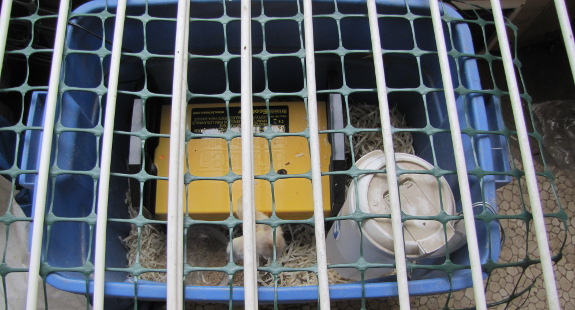

This has been our chick's home all week. (The
fencing on top is to keep out the cats, who were very interested in
their new housemate.) I've kept the chick in the house mostly
because a lone chicken is a lonely chicken, and I wanted to be able to
talk to it and keep it company. The chick and I have really
started to bond, which is a bad thing since I don't know whether it's a
girl (and will stay in our flock for a couple of years) or a boy (and
will grace our table this fall.)
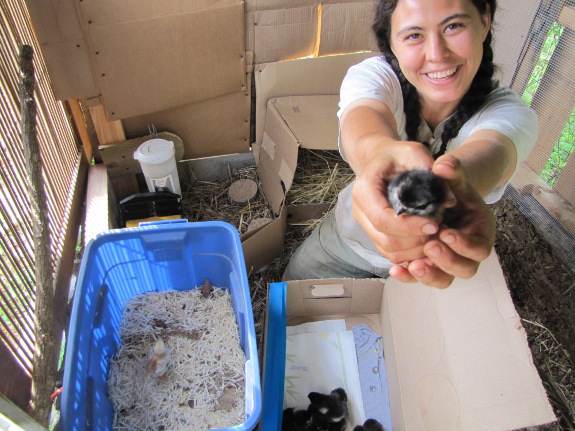
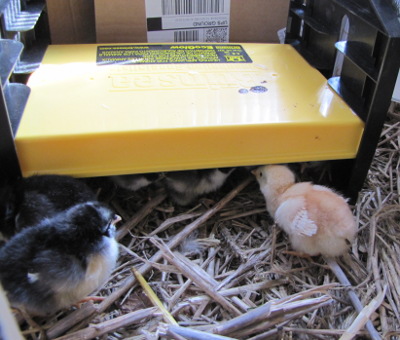 Meanwhile, I started doing
the math and realized we might not have enough eggs this winter if I
didn't act fast. Most chickens start laying when they're six
months old, but if they reach the critical age late enough in the year
when the light is beginning to fade, the hens will hold off until the
spring. We barely had enough eggs this winter with our current,
aging flock, and we definitely need more layers for the winter.
So I decided to take a gamble and buy some local Black Australorp
chicks to keep our homegrown chick company and give us some definite
eggs this fall.
Meanwhile, I started doing
the math and realized we might not have enough eggs this winter if I
didn't act fast. Most chickens start laying when they're six
months old, but if they reach the critical age late enough in the year
when the light is beginning to fade, the hens will hold off until the
spring. We barely had enough eggs this winter with our current,
aging flock, and we definitely need more layers for the winter.
So I decided to take a gamble and buy some local Black Australorp
chicks to keep our homegrown chick company and give us some definite
eggs this fall.
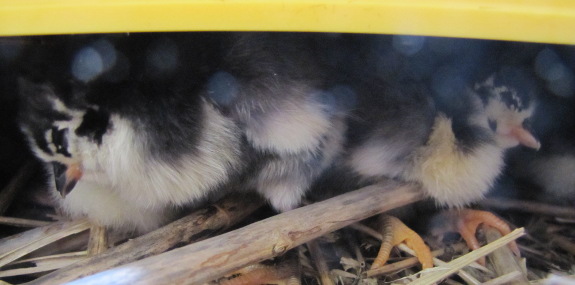
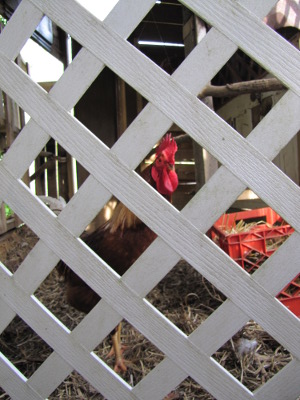 Why is it a gamble?
After perusing Craigslist across a four state area, the chicks closest
to our homegrown chick in age were two days younger. That sounds
like nothing to us, but chickens mature so fast that two days of
chickhood is closer to two years of human infancy. And chickens
are mean, picking on smaller and weaker flockmates relentlessly.
There's a chance that our older chick will beat up the new chicks and
we'll have to separate them.
Why is it a gamble?
After perusing Craigslist across a four state area, the chicks closest
to our homegrown chick in age were two days younger. That sounds
like nothing to us, but chickens mature so fast that two days of
chickhood is closer to two years of human infancy. And chickens
are mean, picking on smaller and weaker flockmates relentlessly.
There's a chance that our older chick will beat up the new chicks and
we'll have to separate them.
We moved our homegrown
chick to a fenced off part of the chicken coop Thursday evening,
introducing sixteen youngsters at the same time. The newcomers
were a bit chilled from their journey and immediately crawled under
their Ecoglow brooder to take a nap, while our
homegrown chick went crazy exploring his new habitat. After a
while, a particularly perky Australorp came out to join him, and our
chick did peck at the youngster a bit, but not so much that the two
couldn't eat at the same food dish.
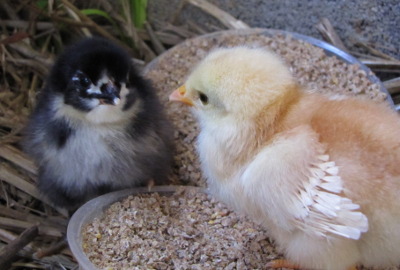 It's too soon to be sure that
the newcomers will get along with their older "sibling", and I'll check
on the flock several times today to make sure there's no bullying going
on. If all goes well, we'll raise the chicks together until
they're old enough to easily sex, then will give our friends five of
the pullets to expand their flock. The cockerels will go in our
bellies, and we'll keep a couple of hens to try out this heirloom
variety in our pasture.
It's too soon to be sure that
the newcomers will get along with their older "sibling", and I'll check
on the flock several times today to make sure there's no bullying going
on. If all goes well, we'll raise the chicks together until
they're old enough to easily sex, then will give our friends five of
the pullets to expand their flock. The cockerels will go in our
bellies, and we'll keep a couple of hens to try out this heirloom
variety in our pasture.
Want more in-depth information? Browse through our books.
Or explore more posts by date or by subject.
About us: Anna Hess and Mark Hamilton spent over a decade living self-sufficiently in the mountains of Virginia before moving north to start over from scratch in the foothills of Ohio. They've experimented with permaculture, no-till gardening, trailersteading, home-based microbusinesses and much more, writing about their adventures in both blogs and books.
Want to be notified when new comments are posted on this page? Click on the RSS button after you add a comment to subscribe to the comment feed, or simply check the box beside "email replies to me" while writing your comment.

Awesome, you got Australorps!
Mine are getting fairly big now - I think I can identify the boys from the girls, but they're not crowing yet so they still have some time. I'll be keeping one boy and all the girls.
If yours are anything like mine, I think you'll love them for their free-ranging ability. Of all my chooks, the Australorps range the furthest from the pen during the day. I feed them in the morning and leave the pen open for them to free-range, and they often don't even bother with my food. They just head out looking for the good stuff. I find them all over the yard through the day, and they really seem to dig and forage well.
I'm very interested to hear how yours do over the next 6-12 months.
Jennifer --- I know!!!
Darren --- It was partly on your recommendation that I decided to go for them. I'm already excited by their foraging ability after just a few hours in the coop. Their first night, one came out to run around and found an ant carrying away a piece of chick feed. Granted, he didn't catch the ant, but he tried his darnedest.